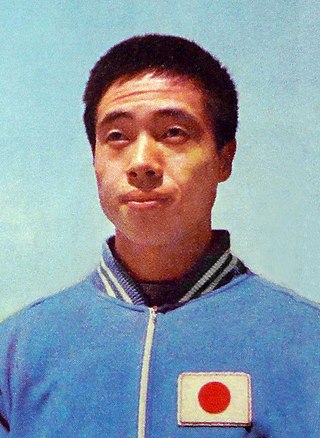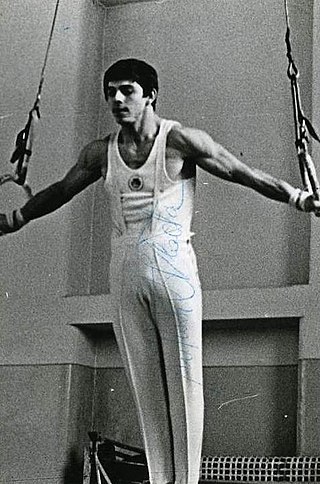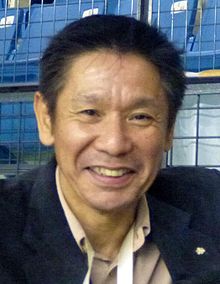
The men's pommel horse competition was one of eight events for male competitors in artistic gymnastics at the 1988 Summer Olympics in Seoul. The qualification and final rounds took place on September 18, 20 and 24th at the Olympic Gymnastics Hall. There were 89 competitors from 23 nations, with nations competing in the team event having 6 gymnasts and other nations having up to 3 gymnasts. For the second time, the event ended in a three-way tie for first place. Dmitry Bilozerchev of the Soviet Union, Zsolt Borkai of Hungary, and Lubomir Geraskov of Bulgaria each received a gold medal. It was Bulgaria's first medal in the pommel horse. Hungary had its third gold medal in four Games, with Zoltán Magyar winning in 1976 and 1980 before the nation was part of the Soviet-led boycott in 1984. The Soviets had had an eight-Games medal streak in the event snapped by that boycott; Bilozerchev's medal put the nation back on the podium after that one-Games absence.

The men's rings competition was one of eight events for male competitors in artistic gymnastics at the 1988 Summer Olympics in Seoul. The qualification and final rounds took place on September 18, 20, and 24th at the Olympic Gymnastics Hall. There were 89 competitors from 23 nations, with nations competing in the team event having 6 gymnasts and other nations having up to 3 gymnasts. For the second consecutive Games, the event ended in a way tie for first place. Dmitry Bilozerchev of the Soviet Union and Holger Behrendt of East Germany each received a gold medal. It was East Germany's first medal in the rings. The Soviets had had an eight-Games medal streak in the event snapped by their boycott of the 1984 Games; Bilozerchev's medal put the nation back on the podium after that one-Games absence. Sven Tippelt, also of East Germany, took bronze.

The men's parallel bars competition was one of eight events for male competitors in artistic gymnastics at the 1988 Summer Olympics in Seoul. The qualification and final rounds took place on September 18, 20 and 24th at the Olympic Gymnastics Hall. There were 89 competitors from 23 nations, with nations competing in the team event having 6 gymnasts and other nations having up to 3 gymnasts. The event was won by Vladimir Artemov of the Soviet Union, bracketing the 1984 boycott with gold medal wins for the Soviets; Valeri Liukin took silver, as well. Sven Tippelt of East Germany took bronze.

The men's horizontal bar competition was one of eight events for male competitors in artistic gymnastics at the 1988 Summer Olympics in Seoul. The qualification and final rounds took place on September 18, 20 and 24th at the Olympic Gymnastics Hall. There were 89 competitors from 23 nations, with nations competing in the team event having 6 gymnasts and other nations having up to 3 gymnasts. There were ties for both gold and bronze medals. The Soviet Union took two golds, as Vladimir Artemov and Valeri Liukin finished even at the top spot; they were the Soviets' first gold medals in the horizontal bar since 1968, and moved the Soviet Union past the United States and Switzerland into second most all-time golds in the event. Bronze medals went to Holger Behrendt of East Germany and Marius Gherman of Romania, the first medal in the event for both nations. It was the first time since 1964 that Japanese gymnasts competed but did not win the event.

The men's vault competition was one of eight events for male competitors in artistic gymnastics at the 1988 Summer Olympics in Seoul. The qualification and final rounds took place on September 18, 20 and 24th at the Olympic Gymnastics Hall. There were 89 competitors from 23 nations, with nations competing in the team event having 6 gymnasts and other nations having up to 3 gymnasts. The event was won by Lou Yun of China, the second man to successfully defend an Olympic title in the vault and fourth man to win two medals of any color in the event. Sylvio Kroll of East Germany took the silver medal, while Park Jong-hoon of South Korea earned his nation's first men's vault medal with his bronze.

The men's individual all-around competition was one of eight events for male competitors in artistic gymnastics at the 1988 Summer Olympics in Seoul. The qualification and final rounds took place on September 18, 20, and 22nd at the Olympic Gymnastics Hall. There were 89 competitors from 23 nations. Each nation could send a team of 6 gymnasts or up to 3 individual gymnasts. The event was won by Vladimir Artemov of the Soviet Union, the nation's sixth victory in the event. The Soviets swept the medals, with Valeri Liukin taking silver and Dmitri Bilozertchev bronze. It was the third medal sweep in the men's all-around; France had done it in 1900 and Japan in 1972.

The men's individual all-around competition was one of eight events for male competitors in artistic gymnastics at the 1972 Summer Olympics in Munich. The qualification and final rounds took place on 27, 29 and 30 August at the Sports Hall. There were 113 competitors from 26 nations. Each nation could send a team of 6 gymnasts or up to 3 individual gymnasts. The event was won by Sawao Kato of Japan, the third man to successfully defend an Olympic title in the event; it was Japan's third consecutive victory in the event. The Japanese gymnasts swept the medals, with Eizo Kenmotsu earning silver and Akinori Nakayama. Kato and Nakayama, who had also taken bronze in 1968, were the eighth and ninth men to win multiple medals overall in the event. It was the first medal sweep in the event since France did it in the first edition in 1900. This broke the Soviet Union's five-Games medal streak, with their best gymnast finishing fourth.

The men's vault competition was one of eight events for male competitors in artistic gymnastics at the 1976 Summer Olympics in Montreal. The qualification and final rounds took place on July 18, 20, and 23rd at the Montreal Forum. There were 90 competitors from 20 nations, with nations competing in the team event having 6 gymnasts while other nations could have up to 3 gymnasts. The event was won by Nikolai Andrianov of the Soviet Union, the nation's fifth gold medal in the men's vault; it was the seventh consecutive Games that the Soviets had a gymnast place in the top two. Andrianov became the third man to win multiple vault medals, adding to his 1972 bronze. Japan returned to the vault podium after a one-Games absence, with Mitsuo Tsukahara taking silver and Hiroshi Kajiyama bronze.

The men's pommel horse competition was one of eight events for male competitors in artistic gymnastics at the 1976 Summer Olympics in Montreal. The qualification and final rounds took place on July 18, 20, and 23rd at the Montreal Forum. There were 90 competitors from 20 nations, with nations competing in the team event having 6 gymnasts while other nations could have up to 3 gymnasts. The event was won by Zoltán Magyar of Hungary, the nation's first victory in the pommel horse since 1932. Eizo Kenmotsu of Japan was the fifth man to win multiple medals in the event, adding a silver to his 1972 bronze. Nikolai Andrianov of the Soviet Union and Michael Nikolay of East Germany tied for third, each receiving bronze medals; this was East Germany's first medal in the event while the Soviet Union stretched its podium streak to seven Games.

The men's parallel bars competition was one of eight events for male competitors in artistic gymnastics at the 1976 Summer Olympics in Montreal. The qualification and final rounds took place on July 18, 20, and 23rd at the Montreal Forum. There were 90 competitors from 20 nations, with nations competing in the team event having 6 gymnasts while other nations could have up to 3 gymnasts. The event was won by Sawao Katō of Japan, the first man to successfully defend an Olympic title in the parallel bars—and, as of the 2016 Games, still the only one to do so. It was the fourth consecutive victory by a Japanese gymnast in the event, breaking a tie with Switzerland for most all-time. Japan was unable to repeat its 1972 medal sweep, as nations were now limited to two finalists each. Nikolai Andrianov of the Soviet Union took silver, while Mitsuo Tsukahara of Japan earned bronze, missing a 1–2 finish for Japan by .025 points.

The men's horizontal bar competition was one of eight events for male competitors in artistic gymnastics at the 1976 Summer Olympics in Montreal. The qualification and final rounds took place on July 18, 20, and 23rd at the Montreal Forum. There were 90 competitors from 20 nations, with nations competing in the team event having 6 gymnasts while other nations could have up to 3 gymnasts. The event was won by Mitsuo Tsukahara of Japan, the second man to successfully defend an Olympic title in the horizontal bar. It was the third consecutive victory by a Japanese gymnast in the event, and fifth in six Games. Japan also took silver, as Eizo Kenmotsu finished second, but was prevented from repeating its 1972 podium sweep by new rules that limited nations to two gymnasts in the final. Tsukuhara and Kenmotsu were the seventh and eighth men to win multiple medals in the horizontal bar. Henri Boerio of France and Eberhard Gienger of West Germany tied for bronze, the first medal for France in the event since 1924 and first horizontal bar medal for West Germany.

The men's rings competition was one of eight events for male competitors in artistic gymnastics at the 1976 Summer Olympics in Montreal. The qualification and final rounds took place on July 18, 20, and 23rd at the Montreal Forum. There were 90 competitors from 20 nations, with nations competing in the team event having 6 gymnasts while other nations could have up to 3 gymnasts. The event was won by Nikolai Andrianov of the Soviet Union, the nation's first victory in the rings since 1960. Another Soviet gymnast, Alexander Dityatin, took silver. The Soviet podium streak in the event reached seven Games. Dan Grecu earned Romania's first medal in the rings. Japan's three-Games gold medal streak and five-Games podium streak in the event ended as the nation's best results were fifth and sixth places.

The men's vault competition was one of eight events for male competitors in artistic gymnastics at the 1980 Summer Olympics in Moscow. The qualification and final rounds took place on July 20, 22 and 25th at the Luzhniki Palace of Sports. There were 65 competitors from 14 nations, with nations competing in the team event having 6 gymnasts while other nations could have to up to 3 gymnasts. The event was won by Nikolai Andrianov of the Soviet Union, the first man to successfully defend an Olympic title in the vault. Andrianov was also the first man to win a third medal in the event, with a bronze in 1972 along with his 1976 and 1980 gold medals. For the eighth consecutive Games, the Soviets had a gymnast in the top two in vault; this time, they had both the top two, as Alexander Dityatin took silver. Roland Brückner of East Germany earned bronze.

The men's pommel horse competition was one of eight events for male competitors in artistic gymnastics at the 1980 Summer Olympics in Moscow. The qualification and final rounds took place on July 20, 22 and 25 at the Luzhniki Palace of Sports. There were 65 competitors from 14 nations, with nations competing in the team event having 6 gymnasts while other nations could have to up to 3 gymnasts. The event was won by Zoltán Magyar of Hungary, the third man to successfully defend an Olympic title in the pommel horse. Silver went to Alexander Dityatin, extending the Soviet Union's podium streak in the event to eight Games. Michael Nikolay of East Germany took bronze for the second consecutive Games. Magyar and Nikolay were the sixth and seventh men to earn multiple pommel horse medals.
The men's individual all-around competition was one of eight events for male competitors in artistic gymnastics at the 1976 Summer Olympics in Montreal. The qualification and final rounds took place on July 18, 20 and 21st at the Montreal Forum. There were 90 competitors from 20 nations. Each nation could send a team of 6 gymnasts or up to 3 individual gymnasts. The event was won by Nikolai Andrianov of the Soviet Union, the nation's fourth victory in the event. It was the Soviets' return to the podium in the event after a one-Games absence in 1972 snapped a five-Games medal streak. Japan, which had swept the medals in 1972, took silver and bronze this time. Two-time defending champion Sawao Kato finished second, becoming the first man to earn three medals in the men's all-around and the most decorated man in the event's history. Mitsuo Tsukahara earned bronze.

The men's vault competition was one of eight events for male competitors in artistic gymnastics at the 1984 Summer Olympics in Los Angeles. The qualification and final rounds took place on July 29, 31 and August 4 at UCLA’s Pauley Pavilion. There were 71 competitors from 19 nations, with nations competing in the team event having 6 gymnasts while other nations could have to up to 3 gymnasts. The event was won by Lou Yun of China, in the nation's debut in the Games.

The men's individual all-around competition was one of eight events for male competitors in artistic gymnastics at the 1980 Summer Olympics in Moscow. The qualification and final rounds took place on July 20, 22 and 24th at the Sports Palace of the Central Lenin Stadium. There were 65 competitors from 14 nations. Each nation could enter a team of 6 gymnasts or up to 3 individual gymnasts. The event was won by Alexander Dityatin of the Soviet Union, the nation's second consecutive and fifth overall victory in the event. It was the second of Dityatin's 8 total medals in 1980, a record that still stands through the 2016 Games. Dityatin's teammate, defending gold medalist Nikolai Andrianov, finished with the silver medal. Andrianov was the 10th man to win multiple medals in the event; he would also finish the 1980 Games with a total of 15 medals over all years—most among men at the time. Bronze went to Stoyan Deltchev of Bulgaria—the first medal in the event by a gymnast not from the Soviet Union or Japan since 1952. It was Bulgaria's first-ever medal in the men's all-around. Japan, which had joined the American-led 1980 Summer Olympics boycott and did not compete, had its six-Games podium streak ended.

The men's rings competition was one of eight events for male competitors in artistic gymnastics at the 1984 Summer Olympics in Los Angeles. The qualification and final rounds took place on July 29, 31 and August 4 at UCLA’s Pauley Pavilion. There were 71 competitors from 19 nations, with nations competing in the team event having 6 gymnasts while other nations could have to up to 3 gymnasts. The event was won in a tie between Li Ning of China, in the nation's debut in the Games, and Koji Gushiken, with Japan's first gold medal in the rings since 1972. The bronze medal went to American Mitchell Gaylord, the nation's first medal in the event since 1932. The Soviet Union's eight-Games podium streak in the event ended with no Soviets competing due to the boycott.

The men's parallel bars competition was one of eight events for male competitors in artistic gymnastics at the 1984 Summer Olympics in Los Angeles. The qualification and final rounds took place on July 29, 31 and August 4 at UCLA’s Pauley Pavilion. There were 71 competitors from 19 nations, with nations competing in the team event having 6 gymnasts while other nations could have to up to 3 gymnasts. The event was won by Bart Conner of the United States, the nation's first victory in the parallel bars since 1904 and second overall. Another American, Mitch Gaylord, took bronze. Japan returned to the podium after the 1980 boycott broke its six-Games medal streak, with Nobuyuki Kajitani's silver.

The men's horizontal bar competition was one of eight events for male competitors in artistic gymnastics at the 1984 Summer Olympics in Los Angeles. The qualification and final rounds took place on July 29, 31 and August 4 at UCLA’s Pauley Pavilion. There were 71 competitors from 19 nations, with nations competing in the team event having 6 gymnasts while other nations could have to up to 3 gymnasts. The event was won by Shinji Morisue of Japan, continuing the nation's dominant streak where it left off before the 1980 boycott. Morisue scored a perfect 20 in the event ; he was one of only three gymnasts to achieve a perfect 20 on an apparatus during the 20-point era (1952–1988). The gold medal was Japan's sixth on the horizontal bar, all within eight Games. Koji Gushiken added a bronze medal for Japan. The People's Republic of China debuted strongly, with a silver medal from Tong Fei.














